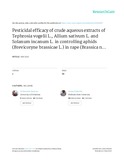Please use this identifier to cite or link to this item:
https://cris.library.msu.ac.zw//handle/11408/991| Title: | Pesticidal efficacy of crude aqueous extracts of Tephrosia vogelii L., Allium sativum L. and Solanum incanum L. in controlling aphids (Brevicoryne brassicae L.) in rape (Brassica napus L.)n controlling aphids (Brevicoryne brassicae L.) in rape (Brassica napus L.) | Authors: | Mudzingwa, Shepherd Muzemu, Simbarashe Chitamba, James |
Keywords: | Brevicoryne brassicae, botanical pesticides, efficacy Tephrosia vogelii, Allium sativum, Solanum incanum, crude aqueous extracts. |
Issue Date: | 2013 | Publisher: | Journal of Research in Agriculture | Series/Report no.: | Journal of Research in Agriculture;Vol. 2(1); p. 157-163 | Abstract: | Cabbage aphid (Brevicoryne brassicae L.) is one of the most problematic pests in smallholder vegetable production, causing significant yield losses in heavy infestations. Current control strategy focuses on use of synthetic pesticides that consequently lead to decimation of natural enemies, development of insect resistance and resurgence and upset biodiversity. Botanical pesticides have been used widely in smallholder farmers but not much documented literature exists on efficacy of these products. A field trial was done to assess the efficacy of crude aqueous extracts of Tephrosia vogelii, Allium sativum and Solanum incanum in controlling Brevicoryne brassicae in Brassica napus production. The trial was laid in a randomized complete block design (RCBD) with five treatments replicated four times. The five treatments used in the experiment were T. vogelii, A. sativum, S. incanum, dimethoate and control. Wingless adult female aphids were inoculated three weeks after transplanting of seedlings. Spraying and data collection were done weekly for four weeks. Data was collected on aphid nymph and adult counts on the third leaf from the aerial plant part of randomly selected plants from each treatment for 24 hours after the application of treatments and total plant fresh weight per each treatment. There were significant differences (p<0.05) in the efficacy of botanicals and synthetics in controlling aphids, with dimethoate being the most effective followed by T. vogelii, A. sativum, S. incanum and lastly the control. The treatments applied had a significant effect (p<0.05) on the yield of rape. It was concluded that T. vogelii, S. incanum and A. sativum aqueous crude extracts have some pesticidal effects on aphid in rape production. | URI: | http://hdl.handle.net/11408/991 |
| Appears in Collections: | Research Papers |
Files in This Item:
| File | Description | Size | Format | |
|---|---|---|---|---|
| 5. JRA_2(1)_157-163_2013.pdf | 672.2 kB | Adobe PDF |  View/Open |
Page view(s)
318
checked on Mar 5, 2026
Download(s)
174
checked on Mar 5, 2026
Google ScholarTM
Check
Items in MSUIR are protected by copyright, with all rights reserved, unless otherwise indicated.



